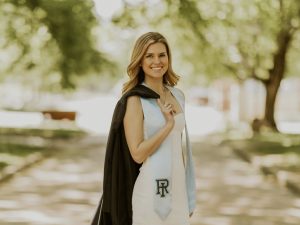Fulbright Scholar’s Spam Folder Held the Key to Her Future
URI helped graduate learn not to sweat the small stuff
 Could the opportunity you’ve been waiting for be hiding in your spam folder? For Heather DiFazio ’23, that’s exactly what happened. As she prepared her Fulbright application, she wrote to Professor Raphael Sznitman at the University of Bern in Switzerland, to express her interest in working with him on developing medical imaging devices that use artificial intelligence (AI). She heard nothing back, or so she thought.
Could the opportunity you’ve been waiting for be hiding in your spam folder? For Heather DiFazio ’23, that’s exactly what happened. As she prepared her Fulbright application, she wrote to Professor Raphael Sznitman at the University of Bern in Switzerland, to express her interest in working with him on developing medical imaging devices that use artificial intelligence (AI). She heard nothing back, or so she thought.
Luckily, DiFazio reached out again and learned she had already received a reply—but it was hiding in her spam folder the entire time. Thanks to her tenacity, she was awarded a Fulbright Scholarship and she will conduct research with Dr. Sznitman at the renowned ARTORG Center.
DiFazio recently graduated from URI’s International Engineering Program, majoring in biomedical engineering, mathematics, and German. Her Fulbright research combines all her
favorite subjects, allowing her to apply the skills she learned while studying at URI.
She knew she wanted to study biomedical engineering when applying to colleges since she loves math and science. At URI, she found an excellent engineering program and financial support from a number of endowed URI scholarships.
“The support from these scholarships has been instrumental during my educational journey, and I am very thankful for the opportunities they have provided” said DiFazio.
As a student, DiFazio was a member of the sorority Zeta Tau Alpha and its executive council, worked as an orientation leader, and was a trip leader for alternative spring break.
“My time at URI has been filled with positive experiences that have shaped my personal growth,” said DiFazio. “I am so thankful that I made this decision.”
She also spent a year in Germany—one semester studying and six months interning with Siemens Healthineers. “My internship was a tremendous learning experience in many aspects,” said DiFazio. “I learned not to stress the small stuff—there will always be challenges, and you just have to find creative solutions.”
She leaves in September for her Fulbright, where she will research the development of an AI module for a surgical intraoperative diagnostic device that can differentiate between tumors and healthy tissue. The AI module would generate a patient-specific profile, allowing surgeons to perform with greater precision and improved outcomes. DiFazio’s work will enable her to participate in the development of medical devices as well as surgical outcomes through a partnership with the Bern University Hospital.